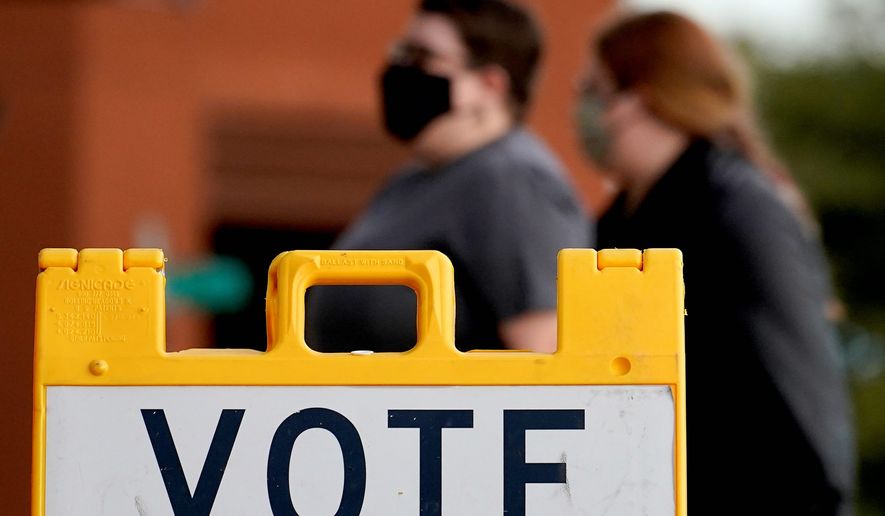The Supreme Court will hear a challenge Tuesday to two Arizona election measures that ban “ballot harvesting” and out-of-precinct voting, a case with broad implications for states moving to enact election-integrity laws in the wake of the bitterly contested 2020 presidential contest.
Advocates on both sides say the high-stakes case also marks the first time that the high court will determine how a key provision of the Voting Rights Act, which forbids states from denying voters’ rights on the basis of race, applies to the rapidly changing landscape of election law. The high court has a 6-3 conservative majority.
A ruling is expected by the end of June. Arizona Attorney General Mark Brnovich told The Washington Times on Monday that the lawsuit “is one of the most important cases of this term.”
“It’ll affect not only Arizona, but every other state that has any sort of ballot-integrity laws,” Mr. Brnovich said in an interview. “If the court does accept the logic of the [Democrats], any future voting-integrity laws or election-protection laws will be in jeopardy. It would lead to a lot more litigation and a lot more distrust.”
Arizona’s legislature passed a law in 2016 that bars get-out-the-vote operatives from collecting mail-in ballots from voters and delivering them to elections officials. The state also has a rule that disqualifies votes cast in the wrong election precinct.
The state and national Democratic Party organizations challenged the ballot-harvesting law, arguing that it discriminates against Hispanic, Black and American Indian voters. Republican state officials say ballot harvesting is susceptible to fraud. Former President Donald Trump repeatedly criticized the practice last year, claiming Democrats cheat with it.
“This is about protecting the franchise, not disenfranchising anyone,” Mr. Brnovich said. “I think part of the lesson of 2020 was that when people don’t believe that elections have integrity or that their vote is being protected, it will lead to undermining the public’s confidence in the system.”
The process is legal in 26 states, but at least 12 of those states restrict the number of ballots a person can collect. Ten states allow ballots to be collected only by a voter’s family member.
But some Republicans also have been warming to the concept of allowing third parties to harvest ballots, saying failing to do so puts the GOP at a competitive disadvantage at election time.
In California, for example, Republicans embraced ballot harvesting in the 2020 election, a move that was credited with helping two GOP candidates win U.S. House seats. It is legal in the state to put out drop boxes and collect ballots at churches, as well as in prosperous retirement communities with Republican-leaning voters.
The San Francisco-based 9th U.S. Circuit Court of Appeals last year ruled that Arizona’s two election rules “have a discriminatory impact on American Indian, Hispanic, and African American voters in Arizona,” in violation of Section 2 of the Voting Rights Act.
The appellate court also ruled that the policies “imposed a significant disparate burden on its American Indian, Hispanic and African American citizens, resulting in the ‘denial or abridgement of the right of its citizens to vote on account of race or color.’”
Despite the court’s decision, the rules remained in place for last year’s election while the case was on appeal.
Arizona’s Secretary of State Katie Hobbs, a Democrat, has urged the high court to uphold the 9th Circuit’s decision.
“Section 2 does not give defendants a get-out-of-jail-free card for one policy with discriminatory intent just because they have other nondiscriminatory policies,” Ms. Hobbs told the court. “The entire political process must be ‘equally open’ to voters of all races.”
At least 43 state legislatures are considering proposals this year to either expand or tighten voting procedures. Democratic-controlled states generally are pushing proposals such as making it easier to vote by mail, while Republican-majority legislatures are seeking measures requiring voter ID or signature verification, among other moves.
Section 2 of the Voting Rights Act, the provision in question in the Arizona case, has been under greater scrutiny since the Supreme Court‘s ruling in Shelby County v. Holder in 2013. In that decision, the justices invalidated Section 5 of the VRA, which had required states with a history of discrimination to clear changes in their election procedures with the Justice Department.
• Dave Boyer can be reached at dboyer@washingtontimes.com.




Please read our comment policy before commenting.